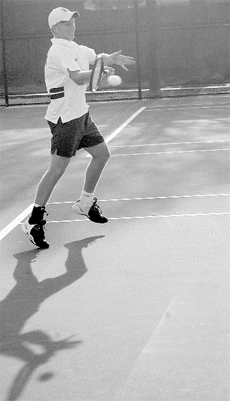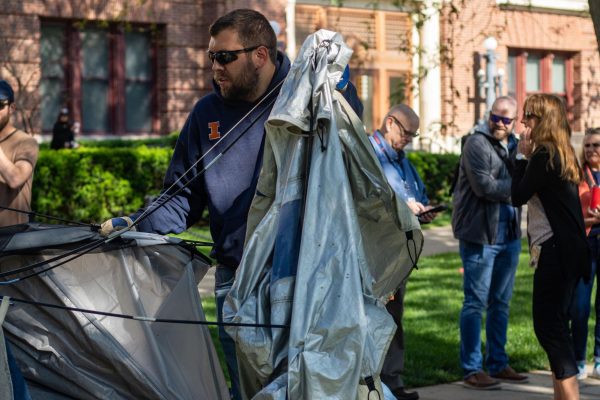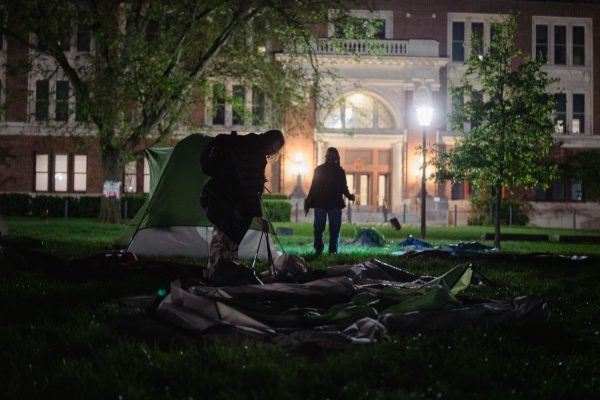Recent ruling could alter college tennis

Daily Illini File Photo
October 7, 2004
A new NCAA rule is expected to level the playing field in men’s collegiate tennis by removing skilled European players from American courts.
The Sept. 21 ruling strips amateur status from tennis players who compete in the popular German tennis league Tennis Bundesliga. The ruling follows years of complaints from Illinois’ Craig Tiley and other coaches who accused competitors of channeling team slots and scholarship dollars to older European players with league experience.
Tiley said the NCAA should have ruled sooner.
“We’ve said all along that those are professional leagues and finally they’ve decided that they are professional leagues,” he said.
Added Michigan coach Bruce Berque: “It’s going to add a level of legitimacy to the sport that wasn’t there before. It will also take the burden of proof off of the schools that are doing things right.”
Get The Daily Illini in your inbox!
Before the Sept. 21 ruling, the NCAA let each university decide if Bundesliga athletes had been paid to play. Athletes ruled ineligible at one school would sometimes show up at another. Now athletes who competed in Bundesliga I and Bundesliga II, the highest division of Tennis Bundesliga, are ineligible.
Both Baylor and UCLA had various divisions of Bundesliga players on their teams when they competed in the NCAA finals last spring.
An NCAA spokeswoman did not know if the September ruling would impact old matches.
“Finally, they’ve made some rulings,” Tiley said. “I still think they should look at it because they knew that those were professional leagues.”
Berque said he believes the new ruling will make it easier to determine which athletes are professionals. Instead of having to prove an athlete took money, one simply needs to prove he played in the league.
“It will make it a lot more difficult for teams to slide players,” Berque, a former Illinois associate head coach, said.
But questions still loom over how the ruling will be interpreted and applied. When the ruling was made, it seemed as though the eligibility issue that haunted college tennis for approximately a decade had been solved. But collegiate tennis has seen few changes so far, said Illinois compliance officer Ryan Squire.
“I figured there was going to be some kind of big blow up where student-athletes around the country were declared ineligible,” Squire said. “I haven’t seen that yet.”
The Illinois men’s tennis team won’t be directly affected. Of the eight Illini that have competed this fall, only 18-year-old GD Jones from Auckland, New Zealand is an international student. Jones, like all international athletes at Illinois, passed a background check performed by an Indianapolis law firm before he was allowed to compete.
“It doesn’t change what we do here at the University of Illinois, because we will continue to do what we do,” Illinois director of compliance Chris Peacock said. “Hopefully, the problems that men’s and women’s tennis run into with these student-athletes competing at other schools will no longer be there. Hopefully, it will level the playing field for our tennis programs.”
Some of Illinois’ biggest rivals on the national scene may be directly affected by the ruling.
But any change has yet to be seen.
The NCAA, which passed the ruling, is not responsible for certifying student-athletes’ eligibility. Instead, each school employs compliance officers who certify the athletes who compete for the school. In the past, some coaches said schools exploited loopholes and turned a blind eye to lax interpretations of the rules.
“I’m disappointed that the NCAA, as I am disappointed that the NCAA Clearinghouse, takes so long to review a situation that everyone knows needs to be reviewed sooner and needs to be corrected,” Tiley said.
Many coaches believe this ruling is only the first step in restoring credibility to collegiate tennis and creating a level playing field.
Berque does not expect the ruling to change everything. Neither does Notre Dame men’s tennis head coach Bobby Bayliss, who, with Tiley, was one of the biggest proponents of the NCAA’s investigation.
“We’ll have to see how it all plays out, but anyone who does recruit from those leagues is making a big mistake,” Bayliss said. “It’s only one country and it’s only two of the leagues. It may temper what other people do – I don’t know that it’s going to revolutionize college tennis.”
Many coaches said there are other amateurism issues that need to be fixed, but Berque said this ruling will eliminate the biggest offenders. He also said the ruling should eliminate some of the bitterness that existed towards international players in the past.
“People will look at them as young amateurs – not athletes who have played on the professional tour and failed,” Berque said. “Coaches who want to have good teams will have to coach their athletes and teach them how to play tennis. They won’t be able to go overseas and get a ringer.”
For now, coaches and compliance officers are waiting. Many, even those who urged the NCAA to investigate, do not know the ramifications of the ruling.
“I think there’s still going to be a lot more that shakes down with this,” Squire, an Illinois compliance officer, said. “I don’t think this is going to be the end of the story quite yet, but we’ll see.”






